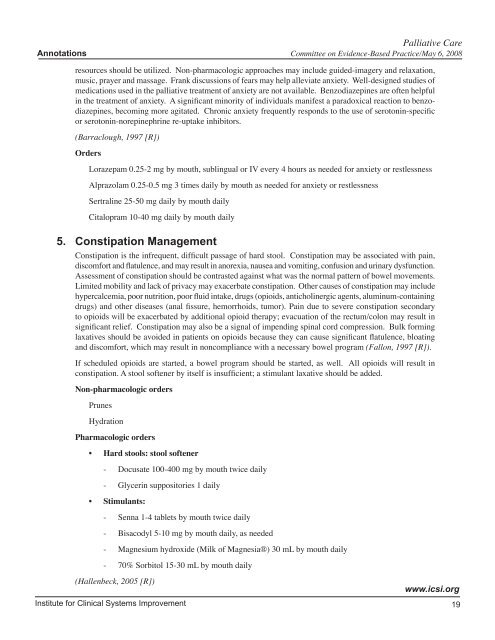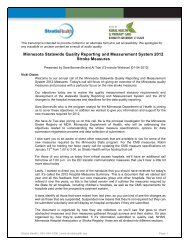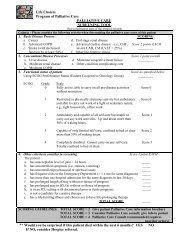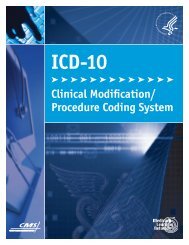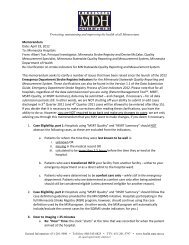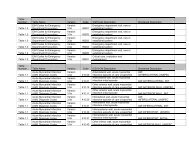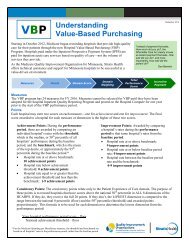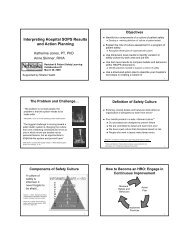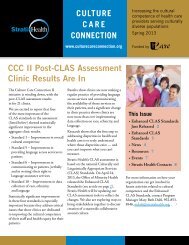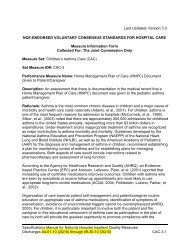Palliative Care Order Set - Stratis Health
Palliative Care Order Set - Stratis Health
Palliative Care Order Set - Stratis Health
Create successful ePaper yourself
Turn your PDF publications into a flip-book with our unique Google optimized e-Paper software.
<strong>Palliative</strong> <strong>Care</strong><br />
Annotations Committee on Evidence-Based Practice/May 6, 2008<br />
resources should be utilized. Non-pharmacologic approaches may include guided-imagery and relaxation,<br />
music, prayer and massage. Frank discussions of fears may help alleviate anxiety. Well-designed studies of<br />
medications used in the palliative treatment of anxiety are not available. Benzodiazepines are often helpful<br />
in the treatment of anxiety. A significant minority of individuals manifest a paradoxical reaction to benzodiazepines,<br />
becoming more agitated. Chronic anxiety frequently responds to the use of serotonin-specific<br />
or serotonin-norepinephrine re-uptake inhibitors.<br />
(Barraclough, 1997 [R])<br />
<strong>Order</strong>s<br />
Lorazepam 0.25-2 mg by mouth, sublingual or IV every 4 hours as needed for anxiety or restlessness<br />
Alprazolam 0.25-0.5 mg 3 times daily by mouth as needed for anxiety or restlessness<br />
Sertraline 25-50 mg daily by mouth daily<br />
Citalopram 10-40 mg daily by mouth daily<br />
5. Constipation Management<br />
Constipation is the infrequent, difficult passage of hard stool. Constipation may be associated with pain,<br />
discomfort and flatulence, and may result in anorexia, nausea and vomiting, confusion and urinary dysfunction.<br />
Assessment of constipation should be contrasted against what was the normal pattern of bowel movements.<br />
Limited mobility and lack of privacy may exacerbate constipation. Other causes of constipation may include<br />
hypercalcemia, poor nutrition, poor fluid intake, drugs (opioids, anticholinergic agents, aluminum-containing<br />
drugs) and other diseases (anal fissure, hemorrhoids, tumor). Pain due to severe constipation secondary<br />
to opioids will be exacerbated by additional opioid therapy; evacuation of the rectum/colon may result in<br />
significant relief. Constipation may also be a signal of impending spinal cord compression. Bulk forming<br />
laxatives should be avoided in patients on opioids because they can cause significant flatulence, bloating<br />
and discomfort, which may result in noncompliance with a necessary bowel program (Fallon, 1997 [R]).<br />
If scheduled opioids are started, a bowel program should be started, as well. All opioids will result in<br />
constipation. A stool softener by itself is insufficient; a stimulant laxative should be added.<br />
Non-pharmacologic orders<br />
Prunes<br />
Hydration<br />
Pharmacologic orders<br />
• Hard stools: stool softener<br />
- Docusate 100-400 mg by mouth twice daily<br />
- Glycerin suppositories 1 daily<br />
• Stimulants:<br />
- Senna 1-4 tablets by mouth twice daily<br />
- Bisacodyl 5-10 mg by mouth daily, as needed<br />
- Magnesium hydroxide (Milk of Magnesia®) 30 mL by mouth daily<br />
- 70% Sorbitol 15-30 mL by mouth daily<br />
(Hallenbeck, 2005 [R])<br />
Institute for Clinical Systems Improvement<br />
www.icsi.org<br />
19


